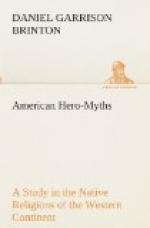[Footnote 1: “In der Sprache herrscht immer und erneut sich stets die sinnliche Anschauung, die vor Jahrtausenden mit dem glaeubigen Sinn vermaehlt die Mythologien schuf, und gerade durch sie wird es am klarsten, wie Sprachenschoepfung und mythologische Entwicklung, der Ausdruck des Denkens und Glaubens, einst Hand in Hand gegangen.” Dr. F.L.W. Schwartz, Der Ursprung der Mythologie dargelegt an Griechischer und Deutscher Sage, p. 23 (Berlin, 1860).]
I make these remarks as a sort of apology for the shortcomings of the present study, and especially for the imperfections of the fragments I have still to present. They are, however, sufficiently defined to make it certain that they belonged to cycles of myths closely akin to those already given. They will serve to support my thesis that the seemingly confused and puerile fables of the native Americans are fully as worthy the attention of the student of human nature as the more poetic narratives of the Veda or the Edda. The red man felt out after God with like childish gropings as his white brother in Central Asia. When his course was interrupted, he was pursuing the same path toward the discovery of truth. In the words of a thoughtful writer: “In a world wholly separated from that which it is customary to call the Old World, the religious evolution of man took place precisely in the same manner as in those surroundings which produced the civilization of western Europe."[1]
[Footnote 1: Girard de Rialle, La Mythologie Comparee, vol. I, p. 363 (Paris, 1878).]
But this religious development of the red man was violently broken by the forcible imposition of a creed which he could not understand, and which was not suited to his wants, and by the heavy yoke of a priesthood totally out of sympathy with his line of progress. What has been the result? “Has Christianity,” asks the writer I have just quoted, “exerted a progressive action on these peoples? Has it brought them forward, has it aided their natural evolution? We are obliged to answer, No."[1] This sad reply is repeated by careful observers who have studied dispassionately the natives in their homes.[2] The only difference in the results of the two great divisions of the Christian world seems to be that on Catholic missions has followed the debasement, on Protestant missions the destruction of the race.
[Footnote 1: Girard de Rialle, ibid, p. 862.]
[Footnote 2: Those who would convince themselves of this may read the work of Don Francisco Pimentel, Memoria sobre las Causas que han originado la Situation Actual de la Raza Indigena de Mexico (Mexico, 1864), and that of the Licentiate Apolinar Garcia y Garcia, Historia de la Guerra de Castas de Yucatan, Prologo (Merida, 1865). That the Indians of the United States have directly and positively degenerated in moral sense as a race, since the introduction of Christianity, was also very decidedly the opinion




